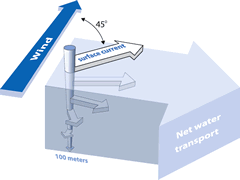The Ekman Spiral
Currents Tutorial
The Ekman spiral, named after Swedish scientist Vagn Walfrid Ekman (1874-1954) who first theorized it in 1902, is a consequence of the Coriolis effect. When surface water molecules move by the force of the wind, they, in turn, drag deeper layers of water molecules below them. Each layer of water molecules is moved by friction from the shallower layer, and each deeper layer moves more slowly than the layer above it, until the movement ceases at a depth of about 100 meters (330 feet). Like the surface water, however, the deeper water is deflected by the Coriolis effect—to the right in the Northern Hemisphere and to the left in the Southern Hemisphere. As a result, each successively deeper layer of water moves more slowly to the right or left, creating a spiral effect. Because the deeper layers of water move more slowly than the shallower layers, they tend to “twist around” and flow opposite to the surface current.
Currents Lessons
- Welcome
- Tidal Currents 1
- Tidal Currents 2
- Waves
- Longshore Currents
- Rip Currents
- Upwelling
- The Coriolis Effect
- Surface Ocean Currents
- Boundary Currents
- The Ekman Spiral
- Thermohaline Circulation
- The Global Conveyor Belt
- Effects of Climate Change
- Age of Exploration
- What is a "knot"?
- Shallow Water Drifter
- Deep Ocean Drifter
- Current Profiler
- Shore-based Current Meters
- How Currents Affect Our Lives?
- References
- Roadmap to Resources
- Subject Review
